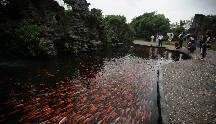Keeping a Pet
Keeping a Pet
Conversation
珍妮: 马克, 这 是 你 的 小狗 吗?
Zhēnní: Mǎkè, zhè shì nǐ de xiǎogǒu ma?
Jenny: Mark, is this your dog?
马克: 是 的。
Mǎkè: Shì de.
Mark: Yes, it is.
珍妮: 真 可爱。你 喂 它 吃 什么?
Zhēnní: Zhēn kě’ài. Nǐ wèi tā chī shénme?
Jenny: Oh, it’s so cute. What do you feed it?
马克: 我 每周 都 为 它 买 狗粮。 你 养 了 什么 宠物?
Mǎkè: Wǒ měizhōu dōu wèi tā mǎi gǒuliáng. Nǐ yǎng le shénme chǒngwù?
Mark: I buy him dog food every week. Do you keep a pet?
珍妮: 我 养 了 两只 小鸟。 我 也 很 喜欢 小猫,
但是 养 了 鸟 就 不能 养 猫 了。
Zhēnní: Wǒ yǎng le liǎngzhī xiǎoniǎo. Wǒ yě hěn xǐhuan xiǎomāo, dànshì yǎng le niǎo jiù bùnéng yǎng māo le.
Jenny: I have two birds. I really like cats too, but I can’t keep cats and birds at the same time.
马克: 你 暑假 回国 的 时候, 你 的 小鸟 怎么办?
Mǎkè: Nǐ shǔjià huíguó de shíhou, nǐ de xiǎoniǎo zěnmebàn?
Mark: But how do you take care of the birds when you go home for summer vacation?
珍妮: 我 托 我 的 朋友 照顾 它们。
Zhēnní: Wǒ tuō wǒ de péngyou zhàogù tāmen.
Jenny: My friend looks after them for me.
马克: 我 也 是, 我 回国 的 时候 我 的 朋友 经常 要 帮 我 照看 小狗。
Mǎkè: Wǒ yě shì, wǒ huíguó de shíhou wǒ de péngyou jīngcháng yào bāng wǒ zhàokàn xiǎogǒu.
Mark: Same here. My friends look after my dog for me when I go home.
珍妮: 我 正好 要 去 宠物 市场 买 点 东西,
我们 一起 去 吧。
Zhēnní: Wǒ zhènghǎo yào qù chǒngwù shìchǎng mǎi diǎn dōngxi, wǒmen yìqǐ qù ba.
Jenny: I’ m going shopping at the pet market. How about going together?
马克:好 的,我们 走 吧。
Mǎkè: Hǎo de, wǒmen zǒu ba.
Mark: Sure, let’s go.
New Words
1. 狗 gǒu dog
2. 猫 māo cat
3. 鸟 niǎo bird
4. 宠物 chǒngwù pet
5.可爱 kě’ài cute
6. 暑假 shǔjià summer vacation
7. 照顾 zhàogù look after
8. 市场 shìchǎng market
The attributive genitive.
When a personal pronoun or a noun is used as an attributive genitive, it generally takes the structural particle 的.
For example:
我 的
wǒ de
My/mine
你 的
nǐ de
Your/yours
他 的/她 的
tā de
His/her(s)
我的电脑
Wǒ de diànnǎo
My computer
珍妮 的小狗
Zhēnní de xiǎogǒu
Jenny’s dog
谁 的 书包?
Shuí de shūbāo?
Whose schoolbag (is this)?
Exercises
Make the pronoun into attributive genitive.
For example:
马克 家
Mark house
马克的家
Mark’s house.
他们 作业
They homework
陈老师 车
Mr. Chen car
谁 铅笔
Who pencil
Reading
中国拥有丰富的动物资源。上百种中国特产的珍稀野生动物闻名于世,比如大熊猫、丹顶鹤、扬子鳄等。大熊猫数量稀少,非常珍贵,其形象被选作世界野生动物保护的标志。丹顶鹤体态优美,在中国是长寿的象征。
Zhōngguó yōngyǒu fēngfù de dòngwù zīyuán. Shàngbǎizhǒng Zhōngguó tèchǎn de zhēnxī yěshēng dòngwù wénmíng yúshì, bǐrú dàxióngmāo、dāndǐnghè、Yángzǐ’è děng. Dàxióngmāo shùliàng xīshǎo, fēicháng zhēnguì, qí xíngxiàng bèi xuǎnzuò shìjiè yěshēng dòngwù bǎohù de biāozhì. Dāndǐnghè tǐtài yōuměi, zài Zhōngguó shì chángshòu de xiàngzhēng.
Translation
China is rich in wildlife. There are more than 100 species of wild animals that can be found only in China, for example the giant panda, red-crowned crane, and Chinese alligator. The panda is very rare, and was chosen as a mascot of the World Wildlife Fund. The red-crowned crane is a beautiful bird and is regarded in China as a symbol of longevity.
Services
Economy
- Eco-agriculture and Eco-tourism Power Nanchang’s Green Development
- Balance Environmental Protection and Economic Prosperity – Nanchang Looks to European Technology for Green Development
- Sustainable Growth Requires Wiser Energy Use
- Chinese Economy: On the Path of Scientific Development
- China's Economy over the Last Ten Years

